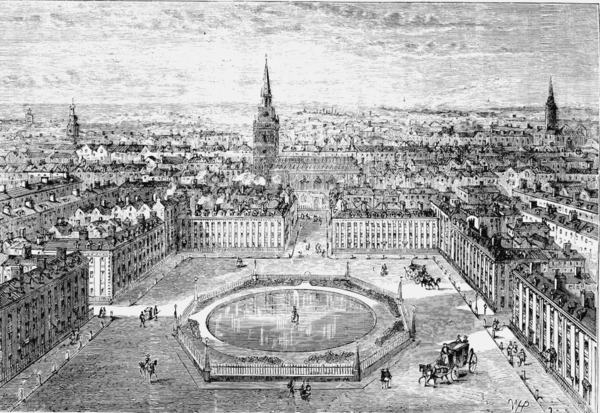Annotation:Ormond House
X:1 T:Ormond House M:2/2 L:1/8 K:Dmin F2A2D2d2|^c2e2A2e2|f2d2a2d2|^c2e2A2e2| f2d2=B2G2|E2e2c2e2|=B2e2A2B2|^G2 A=B c2A2:| |:A2c2G2 cB|A2c2F2f2|=B2d2G2g2|^c2e2A2e2| a2f2d2=B2|g2e2^c2e2|A2f2=B2g2|^c2 de f2d2:|
ORMOND HOUSE. English, Country Dance Tune (2/2 time). D Minor. Standard tuning (fiddle). AABB. The melody first appears in the 11th edition of Henry Playford's Dancing Master, 11th edition (1701, as "Ormon House"), and was retained in the long-running series through the 18th and final edition of 1728 (then published by John Young, heir to the Playford publishing concerns). The title refers to Ormonde House on the north side of St. James's Square, Westminster, the London residence of the powerful Irish-born James Butler (1665-1745), the last Duke of Ormond and a successful military commander[1]. The Butlers were powerful Irish lords and became, after years of loyal service to the crown, ardent Jacobites whose cause was lost along with their lands and title early in the early 18th century after coming out for James Francis Edward Stuart, the "Old Pretender". As with all the Duke’s English property, it was attained in 1716 soon after the accession of Hanoverian King George I. As Protestant nobility the Butlers held Ireland for Charles I and Charles II from their seat at Castle Kilkenny, but maintained other residences, including Ormonde House, in London on St. James's Square, at the very center of the fashionable world.

Ormonde House was lavish and its expenses were crippling. During the latter seventeenth century it had some 41 household servants, a gentleman of the horse, ten stablehands, a chasseur, two chairmen and seven watermen. Cassell's Old and New London: Volume 4 (London, 1878) recorded:
The Duke of Ormonde, who was living here in the reign of Queen Anne and George I., was said to have been the best bred man of his day. He entertained largely and liberally, but he allowed the bad practice of his servants taking money from his guests. Dr. King tells the following story in his "Anecdotes of his Own Times:"—"I remember a Lord Poer, a Roman Catholic peer of Ireland, who lived upon a small pension which Queen Anne had granted him: he was a man of honour, and well esteemed; and had formerly been an officer of some distinction in the service of France. The Duke of Ormonde had often invited him to dinner, and he as often excused himself. At last the duke kindly expostulated with him, and would know the reason why he so constantly refused to be one of his guests. My Lord Poer then honestly confessed that he could not afford it; 'but,' says he, 'if your Grace will put a guinea into my hands as often as you are pleased to invite me to dine, I will not decline the honour of waiting on you.' This was done; and my lord was afterwards a frequent guest in St. James's Square."
- ↑ This James succeeded his father, also James Ormond, the first Duke of Ormond of Ireland, and later England, who served six terms as Lord Lieutenant of Ireland. He died in 1688.

